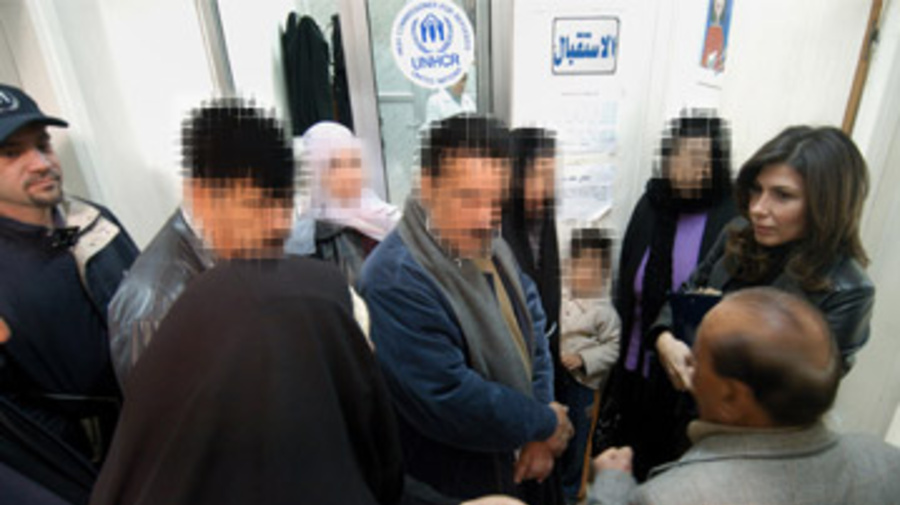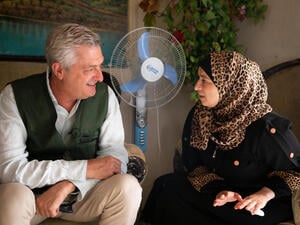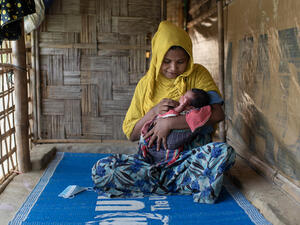UN agencies seek US$85 million to fund health projects for Iraqi refugees
UN agencies seek US$85 million to fund health projects for Iraqi refugees

Keeping Heathy. Iraqi refugees at a medical centre in Damascus. UNHCR and sister agencies have launched an appeal for funds to help host countries provide health care for Iraqi refugees.
GENEVA, September 18 (UNHCR) - UNHCR and sister agencies on Tuesday issued an appeal for US$84.8 million to help host countries meet the health and nutrition needs of hundreds of thousands of Iraqi refugees.
The joint appeal, launched in Geneva by UNHCR, the World Health Organization (WHO), the UN Population Fund (UNFPA), the UN Children's Fund (UNICEF) and the World Food Programme (WFP), emphasizes the basic health needs of Iraqis in neighbouring countries, especially Syria and Jordan, which host an estimated 1.5 million and 750,000 Iraqis respectively.
The UN refugee agency has asked for US$49.2 million of the total, earmarking this for improvements in primary and advanced care; management of chronic diseases; support for state-run health clinics and hospitals; and purchases of medicine and equipment, including ambulances. UNHCR also needs financial help to develop strategies to deal with sexual and gender-based violence.
"The health needs of more than two million displaced Iraqis should not be ignored. Many are survivors of violence and have serious medical conditions. Hundreds of thousands of Iraqi displaced children need to keep on track with their vaccination programme. This requires an enormous coordinated effort with governments and UN agencies and NGOs and requires significant financial support from the international community," said a joint statement.
Meanwhile, Radhouane Nouicer, UNHCR's director for the Middle East and North Africa, said the health appeal showed that the situation in Iraq was gaining wider attention and required more support. "A more robust intervention by the international community through bilateral and multilateral channels is needed," he added.
The large numbers of people who have arrived in Syria and Jordan over the past year have put an enormous strain on the already overstretched public services in those countries and pose major challenges to the host governments as well as local and international organizations.
"In Syria alone, hundreds of Iraqi amputees need prostheses and thousands of cancer patients and trauma victims need specialized treatment," said the joint press release. "Access to hospital care is limited. Gaps have arisen in the national health information and disease surveillance systems, which increase the risk of vaccine preventable diseases," the release added. The displaced Iraqi population also needs reproductive and child health services.
UNHCR, in cooperation with the Syrian Arab Red Crescent Society, has been providing health care assistance to Iraqi refugees and to host governments. "In Syria alone, we have rehabilitated and are supporting six clinics, provided ambulances and renovated a hospital floor to be used to care for Iraqis," Nouicer said.
The refugee agency is also providing specialized care for cancer and heart patients and counselling for traumatized Iraqis, he said, adding: "We are expanding our care for thousands of severely affected Iraqis and hope to expand this support during 2008."
UNHCR recently signed an agreement with the Syrian Ministry of Health to support 50 public health centres, while an accord has been signed with a Damascus hospital for specialized treatment of 500 cancer patients.
In Jordan, UNHCR supports four clinics and has set up referral systems for Iraqi refugees to receive urgent secondary and tertiary treatment at public and private hospitals in Amman. UNHCR also funds psychosocial care for traumatized Iraqis.
Since the start of this year, UNHCR has launched appeals in January, April and July for its Iraq-linked programmes, including projects aimed at ensuring education for refugees in host countries and help for host communities.









